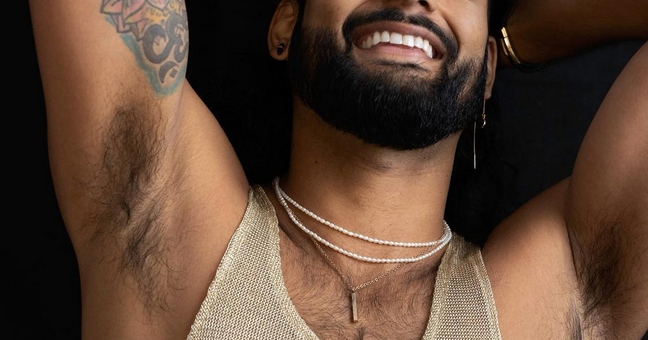
Despite the novelty of the genre, some reality TV contestants come with stories that speak to a very real shared experience. That’s the case for Nashville native and first-generation American, Kishan Patel.
Long before he was recruited for a major VH1 reality TV project, Patel was raised in a traditional Indian family, who lived in a hotel on Dickerson Road.
“It wasn’t the most luxurious place to grow up, but it was a good upbringing,” Patel said. “We’ve had people that came in with snakes and stuff. It was just a lot of random stuff happening all the time. That area kind of was a little rundown. We had to fence our motel in just because of the people that hung around that area.”
At school, Patel already stood out from most classmates fairly easily as one of only a handful of students of color, with a family history apart from his peers.
“Along with being a first-generation American, there is a lot of new learning curves,” Patel said. “(My parents) weren’t taught a lot of stuff, so I had to teach myself a lot of things in school and a lot of different areas in my life growing up.”
Unbeknownst to Patel’s parents, he carried a secret he feared, if revealed, would brush up against not only against their values, but also those of the world he called home.
Patel was gay.
“It’s no secret that the South is known as being very religious and conservative and that held very true when I was younger. Another part was just with my culture, being Indian. It’s very image- and status-based,” Patel said. “You don’t want to tarnish your family’s name and background.”
“I’ve heard stories about people being kicked out of their household and disowned from their families for coming out. So in my head, I knew I was gay since I was very young, but I always had to kind of hide it and learn how to act and be someone else.”
It wasn’t just his family he felt he had to hide from, and though closeted, he was the target of frequent jokes.
“I’d be around friends and a gay person would walk into a restaurant and they’d start making snide remarks and stuff at the table and making jokes. I’d have to laugh along,” Patel said. “It was just kind of a small torture having to do that when you know that’s you and your friends are thinking that.”
“I had to try and act straight, but I knew I wasn’t,” he continued. “People would make me say that I’m not (gay) just to laugh at me.”
With cultural pressures bearing in from all sides, Patel had resigned himself to a less than optimal life.
“I always told myself that if I did want to come out, I’d need to be independent first and be paying for my living,” Patel said. “… In my head, I just imagined that I’d probably get married to a woman and just live in the closet for the rest of my life just to make (my parents) happy. I was OK with living a happy life for their happiness basically.”
After Patel graduated from the University of Tennessee, a place he also feared to be his true self, he contemplated his circumstance when his parents began browsing a network of individuals to arrange a marriage for their son.
“It was really weighing in on me,” Patel said. “At that time it changed my way of thinking. I was OK with living a life of unhappiness for their happiness, but when I thought about ruining someone else’s life, I couldn’t do that.”
Patel came out to his mother at 23.
“I feel like I put myself through more torture than I imagined the torture would be being out,” Patel said. “The mental torture, over any other torture of being out and dealing with bigotry and homophobia and all that stuff, I think took so much more of a toll on me because it’s you doing it to yourself rather than an outside force doing it, which you can brush off a lot easier.”
After an early period of insisting they could find Patel a suitor that would “be OK with it,” both parents eventually came to a place of acceptance.
“I guess it’s kind of a disappointment for them, not really because they don’t love me or anything, but because they love me so much that they don’t want me to deal with all the struggles that go along with it,” Patel said.
The discrimination obstacles
Despite finding the strength to be himself and also developments in LGBTQ+ rights at the national level, Patel and his peers, who comprise 5.6% of the U.S. population, still face further challenges in the places they call home once through to the other side.
In terms of mental health, almost half of LGBTQ+ youth contemplated suicide in 2021, according to The Trevor Project.
And for his part, Patel found that there were risks inherent to seeking the simple independence he’d desired to ensure his own personal freedom.
According to Out Leadership’s Business Climate Index, Tennessee ranks next to last in the nation, behind only South Carolina, in terms of its policy and survey-based inclusion score.
In Nashville, while workplace discrimination based on sexual orientation is prohibited in the public sector, it wasn’t until a 2020 Supreme Court decision that those protections were extended to the private sector.
Additionally, Tennessee adoption and welfare agencies can still legally reject LGBTQ+ parental hopefuls if the agency cites “sincerely held religious beliefs.” Meanwhile, a bill in the Tennessee General Assembly has legislators mulling limiting teachers’ ability to teach LGBTQ+ related topics.
Those ideas, alongside incidences of bigotry, pushed Patel away by 2016. He recalled hitching a ride in a truck on a night out with a few of his friends, only to be verbally accosted and have objects thrown at them by the driver as they were kicked out.
“It breaks you down. My whole life I feel like I’ve been broken down and I’m slowly putting the pieces back together, but it’s definitely held with glue and they can easily break that down so fast,” Patel said. “It’s been a hard life to piece back together because of those kind of instances.”
Patel admits seeing progress and isn’t as afraid as he once was, as Nashville has steadily become more open, now boasting a pride parade and the Outloud Music Festival among numerous advocacy organizations. Still, he says the progress has come in relative terms and only in certain corners.
“There’s still a long way to go. And that’s one of the reasons I moved from Nashville. I love Nashville. I grew up there. My parents are still there. So I would love to be able to move back there,” Patel said. “But there’s no way that I will until I feel comfortable doing so, which I don’t see happening anywhere in the near future.”
Patel now makes a home in Hollywood working as an accountant. There, he was recently selected as a participant on the upcoming VH1 reality series “Vanjie: 24 Hours of Love.”
While ultimately just a reality show at its core, the experience will find Patel seeking out a first relationship as a gay man after self-depriving to the age of 32.
“When you wait so long it feels like you’ve lied to everyone, and it’s hard to change that. I didn’t really start trying to live my real authentic gay life until last year. I’m very new to being me,” Patel said.
“I’m very hopeful for finding someone that I can be with and love and just have some bit of that kind of intimacy where I grew up not having any any intimacy at all,” he continued. “It’s been a struggle, but I’m also very hopeful and excited to see where things take me now.”
As for those back home, Patel offered perspective on Nashville’s relationship with the gay community.
“When people are so scared of going to a drag show or being around gays or going to a gay club, that is exactly what the life we live is like. We’re a straight person being in a gay club our whole life. That’s how we feel the whole time,” Patel said. “Being receptive and making them feel comfortable is what we do all the time. If they just put themselves in that mindset of, ‘What if I were in that situation?’ and just had empathy and compassion, I think it would help a lot.”








